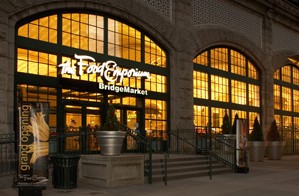Think UDRP panels are inconsistent? Here’s proof.

If you think UDRP panel decisions are inconsistent, look no further than three cases involving New York grocer The Food Emporium. It filed three separate actions under UDRP for FoodEmporium.com, FoodEmporium.net, and FoodEmporium.org. It won .org but lost the other two.
There are reasons for the differences, including the registrant of .org not responding to the complaint. But if you read the decisions you’ll see inconsistencies. For example, the panel on the .com writes:
“Respondent’s use of the generic term in its domain name as a means of attracting Internet users to its website to access hyperlinks that offer goods and services related to the generic term is legitimate.”
OK, so a parked page is a legitimate use, right? Not according to the panel on the .org:
“Respondent is using the foodemporium.org domain name to advertise links to third-party competitors. The Panel finds that such use is not a bona fide offering of goods or services under Policy ¶ 4(c)(i) or a legitimate noncommercial or fair use under Policy ¶ 4(c)(iii)”.
Also, the panel on .com found that The Food Emporium’s case for the domain being confusingly similar was “very close”, while in the .org it just said it was confusingly similar.
Hmm.
So why did The Food Emporium win one and lose the others other than these discrepancies?
Frank Schilling’s Name Administration owns FoodEmporium.com. John Berryhill defended the domain and successfully argued that the term “Food Emporium” is generic and that Schilling didn’t know about the New York grocery chain.
Name Media (BuyDomains) owns FoodEmporium.net. Not only does the company have a solid record of only registering generic domain names, but it also signed affidavits ensuring the panel that it did not register the domain with the New York grocery chain in mind. It also showed that the trademark was filed after the initial registration (although the grocery chain claims common law rights extending back into the 1980s). The panel found that it wasn’t registered in bad faith.
FoodEmporium.org is protected by whois privacy at Intercosmos. The registrant never responded.
This is an excellent case study for defending your domains properly. But above that, it shows gross inconsistencies between panels.






Hi Andrew,
You are certainly right about the inconsistencies.
And I have read many decisions where the Arbitrator(s) decided a Parked domain is not a legitimate use.
In the above 2 cases you cite it seems to me
there was a big difference between HOW the domains were Parked that account for the difference in the results.
For example, In the FoodEmporium.com case, the Panel says:
“Respondent’s use of the generic term in its domain name as a means of attracting Internet users to its website to access hyperlinks that offer goods and services related to the generic term is legitimate.”
Notice this part:
“…hyperlinks that offer goods and services related to the generic term…”
In the FoodEmporium.org decision, the Panel says:
““Respondent is using the foodemporium.org domain name to advertise links to third-party competitors. ”
That the links were to direct Food Emporium competitors might account for the different decision.
But yes, Domain Arbitration is ofter a crap shoot.
Patrick
Correction:
there was a big difference between HOW the domains were Parked that MIGHT account for the difference in the results.
Andrew,
As you said, this is an excellent example of why one should answer an UDRP complaint.
Very rarely do we have an example of the effect of responding or not responding.
Thanks for the information.
Patrick, I think both parked pages provides ads to what Food Emporium would call “competitors”, it’s just how the panelists interpreted that.
A&P’s argument in these cases was a classic example of taking it a bit too far.
The trademark registration at issue was based on section 2(f) of the Lanham Act. Under that provision, rights can be found in a descriptive term, provided that the term has been used for a prescribed amount of time, and that the applicant shows sufficient evidence of acquired distinctiveness up to a certain point in time.
Now, if you check the USPTO database, you’ll notice that the filed several previous applications, and failed each time. The last – and figurative – registration was allowed on a 2(f) basis.
I believe the panels in the two defended cases were not impressed with A&P having argued and sworn to one set of facts in their trademark application, but a different set of facts in their UDRP filings.
“Very rarely do we have an example of the effect of responding or not responding.”
Zero.us – Pirelli & C. S.p.A. v Were,LLC – Response filed, complaint denied
Zero.net – PIRELLI & C. S.p.A. v Oakwood Services Inc. – Response filed, complaint denied
Zero.org – Pirelli & C. S.p.A. v Daniel Engel c/o Engel Consulting, Inc. – Default, transfer
Thanks John